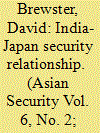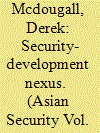| Srl | Item |
| 1 |
ID:
096897


|
|
|
|
|
| Publication |
2010.
|
| Summary/Abstract |
In 2008, India and Japan made a joint security declaration while asserting that a strategic partnership between the two countries would become an essential pillar for the future architecture of the region. This article examines whether the security declaration is a step toward building an enduring security partnership. It will consider perceptions in Japan and India of the bilateral security relationship, proposals for how to give it substance, and key issues that may impede the deepening of the relationship. This article will conclude that although there is no clear consensus as to the substance of the relationship, the relationship between India and Japan is likely to grow in coming years.
|
|
|
|
|
|
|
|
|
|
|
|
|
|
|
|
| 2 |
ID:
096899


|
|
|
|
|
| Publication |
2010.
|
| Summary/Abstract |
Australia's decision to sign the Nuclear Nonproliferation Treaty and forego the acquisition of nuclear weapons was taken on medium-term strategic grounds. While similar circumstances prevail today, it is possible to identify three conditions for the acquisition of nuclear weapons by Australia to be a credible option: the existence of a major threat to Australia; a loss of confidence in US guarantees; and allied acquiescence to an Australian nuclear program. These conditions interact with Australia's relationship with Indonesia and the technological and industrial feasibility of "tactical" and "strategic" nuclear weapons postures, respectively. The only Australian nuclear posture that does not lack credibility in light of all these factors is the use of "tactical" weapons to deter major landings on the Australian mainland.
|
|
|
|
|
|
|
|
|
|
|
|
|
|
|
|
| 3 |
ID:
096898


|
|
|
|
|
| Publication |
2010.
|
| Summary/Abstract |
Central Asia's Soviet past continues to haunt the five successor sovereign states with water, a contentious issue. Although fundamental to survival and livelihood, regional cooperation over the precious resource remains a patchwork of short-term stop-loss agreements at best and an exercise in "frameworks without content" at worst. This article seeks to explain why this is so, based on a theoretical position derived from hydro-political discourse. The eclectic explanations include the hydro-hegemonic void created by the removal of Soviet authoritarianism; the securitization of the hydro-political complex in Central Asia; unilateral and bilateral substitutes for multilateral water resource cooperation; and the ineffectiveness of international law - all of which contribute to the impasse over water cooperation.
|
|
|
|
|
|
|
|
|
|
|
|
|
|
|
|
| 4 |
ID:
096900


|
|
|
|
|
| Publication |
2010.
|
| Summary/Abstract |
The focus of this article is the relationship between security and development in East Timor and Solomon Islands. External intervention occurred in East Timor in 1999 and 2006, and in Solomon Islands in 2003. Intervention was effective in restoring order in these situations in the short term, but questions remained about long-term strategies for achieving security. Although "development" is proposed as the best way to attain security broadly defined, there are arguments about what development should entail and who should determine its direction. Development strategies giving greater attention to the local level and to customary governance are more likely to achieve legitimacy than those that focus on state-building alone, thus contributing to greater security in the long term.
|
|
|
|
|
|
|
|
|
|
|
|
|
|
|
|